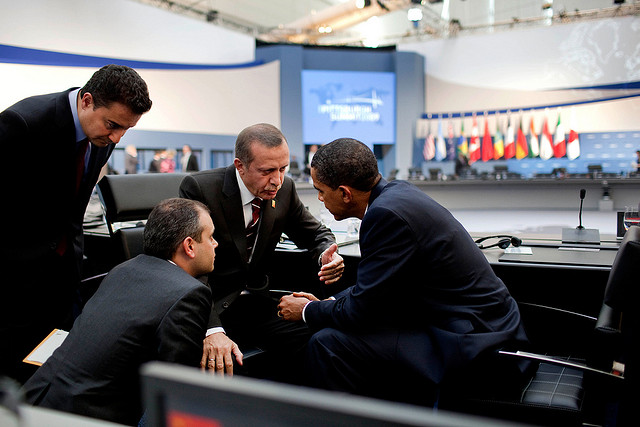
Turkey Takes Aim
Since the deadly terrorist attacks that killed 30 in Suruc two weeks ago, President Recep Erdogan has initiated an air campaign on the Islamic State (Daesh in Arabic). Yet, the Turkish government’s efforts have been aimed largely at Kurdish positions in northern Iraq more than Daesh positions in Syria.
While initial airstrikes were on Daesh positions, Turkey hasn’t hit the terrorist group since last Friday. Yet, airstrikes have continued on the Kurdistan Workers Party (PKK), with the Turkish air force conducting their heaviest assault this morning. The PKK, which shot two Turkish police officers last week, is considered a terrorist organization by the Turkish government.
Today, President Erdogan declared peace talks with Kurds futile, saying:
“[It is] Not possible to continue the peace process with those who threaten our national unity and brotherhood.”
Turkey, utilizing its North Atlantic Treaty Organization (NATO) membership, called for an Article Four consultation, which allows any member nation to call a meeting in regards to threats against its independence, territory, and security. While the threat of Daesh is widely accepted by NATO, Turkey’s case against the Kurds is more difficult for Erdogan to sell.
Despite the president’s campaign against the Kurds, the US willingly accepts Turkey’s more active role in fighting the Islamic State. Turkey will now allow US planes to fly missions out of its Incirlik base after months of failed US efforts to gain access to the base.
Reports claim that the Turkish government is cracking down on members of the PKK and other leftist parties as a political tool to weaken the Kurds’ position in the forming coalition government. With the arrest of over 1,000 members of the PKK, the People’s Democratic Party (HDP) and Daesh in the past week, it seem Erdogan is set on sabotaging the success of HDP on winning a substantial number of seats in parliament.
While the Turkish Government may use the guise of attacking Daesh to initiate a political and military campaign to weaken Kurdish parties, the US needs partners committed to degrading the capabilities of Daesh.
When asked to clarify the US stance on Turkey’s bombing of PKK positions in Northern Iraq, State Department Spokesman John Kirby stated:
“PKK is a foreign terrorist organization, Turks have a right to defend themselves against it. There’s no connection between what they did against PKK and what we’re going to try to do together against ISIL [Daesh].”
While the timing may have been exploited by the Turks to weaken the Kurdish front, Turkey’s campaign against the PKK is detrimental to the fight against Daesh. While the US has a strategic interest in having Tukey support its efforts against Daesh, it should be wary of the consequences of alienating other Kurdish forces who have been integral to fighting Daesh on the ground. Turkey’s political interests may align with US security interests in the region at the moment, but to lose the support of the Kurdish forces in Iraq and Syria could prove costly to US interests in the long-run.






